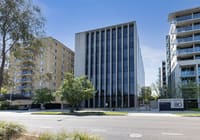
Who stands to benefit from Fishermans Bend?
The value of land for large Fishermans Bend landowners including Goodman Group, Dexus and GPT Group remains in question because the Victorian state government has failed to commit to transport connections to the 480-hectare precinct on Melbourne’s edge.
Owners and developers got some certainty around the former industrial precinct on the southern edge of Melbourne’s Docklands on Friday with the announcement by Planning Minister Richard Wynne of a planning framework to guide development of the area into a residential and employment hub.
However, the lack of a state commitment to build the tram and rail services slated for the area is likely to continue the political uncertainty that has hamstrung decisions around the site bound by the Yarra River and Williamstown Road as the ability to move large volumes of workers and residents in and out of the precinct is crucial.
“A firm commitment to the timing and funding of infrastructure will be the real catalyst for transaction activity in this precinct,” Colliers industrial director Alysia Reilly said.
“However, the new controls and finalisation of the framework plan are massive steps forward and will provide some key landowners with the confidence to sell knowing the true underlying value of their land based on future development capacity.”
None of the land at the precinct that developed as a manufacturing hub from the 1930s – when General Motors Holden first assembled imported chassis and engines and later started building locally produced cars – is publicly owned. Many private owners, including the Herzog Group and Jane Property Group, own sites, but much of the precinct – both in areas designated for future residential development and for employment – is in the hands of institutional owners, who stand to gain once demand for sites in the precinct pick up.
Goodman is the largest landowner, owning 33 hectares, most of it in precincts slated for residential development. Dexus accounts for five hectares across the employment and residential precincts and GPT has 2.5 hectares in the employment hub. Other landlords include BWP Trust and APN Property.
But the uncertainty created by repeated changing of the rules in Fishermans Bend has dampened transactions. In 2012 then planning minister Matthew Guy rezoned four of the precincts in the site overnight as capital city zone, effectively removing height limits and making little provision for the funding of infrastructure in the area. Mr Wynne overturned that regime in 2015 by imposing interim controls that were replaced with permanent ones last week.
Just one development site sold across the combined precincts this year, compared with six last year, Colliers figures show.
Transport certainty needed
Land rates vary between the four different sub-precincts, with the two closest to the CBD (Montague and Lorimer) fetching an average of $6000 per square metre over the past five years, compared to the average $1900 per square metre in the Sandridge and Wirraway precincts.
“Each time the planning controls change, there is a flow-on effect to the development capacity of a site and fundamentally, its feasibility,” Ms Reilly said.
Planning certainty is good, but transport certainty is now needed. The new framework affirms previously identified routes and land for tram and rail lines, but says funding them is up to future budgetary processes.
Earlier this year consultancy AECOM put the likely cost of extending the existing tram lines down Collins Street into Fishermans Bend at $1 billion and said this was a priority for drawing investment and for making the precinct work. Arup principal and former Labor planning minister Justin Madden said the urban regeneration zone needed $10 billion of transport infrastructure to be viable.
“While it’s still early days, we welcome today’s planning announcement,” GPT’s head of office and logistics Matthew Faddy said on Friday. “The framework provides for much-needed transport infrastructure, which is a fundamental requirement in improving the Employment Precinct.”
Ms Reilly agreed. “Until there is a firm commitment to the timing of the infrastructure, we don’t foresee there being a significant amount of transaction activity in the precinct. We anticipate that just the odd site will trade here and there, as has been the case recently, until there is a commitment to timing and funding of infrastructure”.
Dexus declined to comment on its holdings, saying they were held by third-party clients in its funds management business.
“The investment at Fishermans Bend has performed strongly for AMP Capital and there’s no development earmarked for the site at this point in time,” an AMP Capital spokesman said.
*The writer holds shares in Goodman Group.











